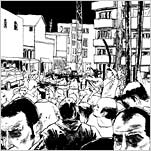Following is the text of President Obama's remarks in Arizona, as prepared for delivery and provided by The White House.
Blog

The Caucus
The latest on President Obama, the new administration and other news from Washington and around the nation. Join the discussion.
I'm here today to talk about a crisis unlike any we've ever known – but one that you know very well here in Mesa, and throughout the Valley. In Phoenix and its surrounding suburbs, the American Dream is being tested by a home mortgage crisis that not only threatens the stability of our economy but also the stability of families and neighborhoods. It is a crisis that strikes at the heart of the middle class: the homes in which we invest our savings, build our lives, raise our families, and plant roots in our communities.
So many Americans have shared with me their personal experiences of this crisis. Many have written letters or emails or shared their stories with me at rallies and along rope lines. Their hardship and heartbreak are a reminder that while this crisis is vast, it begins just one house – and one family – at a time.
It begins with a young family – maybe in Mesa, or Glendale, or Tempe – or just as likely in suburban Las Vegas, Cleveland, or Miami. They save up. They search. They choose a home that feels like the perfect place to start a life. They secure a fixed-rate mortgage at a reasonable rate, make a down payment, and make their mortgage payments each month. They are as responsible as anyone could ask them to be.
But then they learn that acting responsibly often isn't enough to escape this crisis. Perhaps someone loses a job in the latest round of layoffs, one of more than three and a half million jobs lost since this recession began – or maybe a child gets sick, or a spouse has his or her hours cut.
In the past, if you found yourself in a situation like this, you could have sold your home and bought a smaller one with more affordable payments. Or you could have refinanced your home at a lower rate. But today, home values have fallen so sharply that even if you made a large down payment, the current value of your mortgage may still be higher than the current value of your house. So no bank will return your calls, and no sale will return your investment.
You can't afford to leave and you can't afford to stay. So you cut back on luxuries. Then you cut back on necessities. You spend down your savings to keep up with your payments. Then you open the retirement fund. Then you use the credit cards. And when you've gone through everything you have, and done everything you can, you have no choice but to default on your loan. And so your home joins the nearly six million others in foreclosure or at risk of foreclosure across the country, including roughly 150,000 right here in Arizona.
But the foreclosures which are uprooting families and upending lives across America are only one part of this housing crisis. For while there are millions of families who face foreclosure, there are millions more who are in no danger of losing their homes, but who have still seen their dreams endangered. They are families who see "For Sale" signs lining the streets. Who see neighbors leave, and homes standing vacant, and lawns slowly turning brown. They see their own homes – their largest single assets – plummeting in value. One study in Chicago found that a foreclosed home reduces the price of nearby homes by as much as 9 percent. Home prices in cities across the country have fallen by more than 25 percent since 2006; in Phoenix, they've fallen by 43 percent.
Even if your neighborhood hasn't been hit by foreclosures, you're likely feeling the effects of the crisis in other ways. Companies in your community that depend on the housing market – construction companies and home furnishing stores, painters and landscapers – they're cutting back and laying people off. The number of residential construction jobs has fallen by more than a quarter million since mid-2006. As businesses lose revenue and people lose income, the tax base shrinks, which means less money for schools and police and fire departments. And on top of this, the costs to a local government associated with a single foreclosure can be as high as $20,000.













